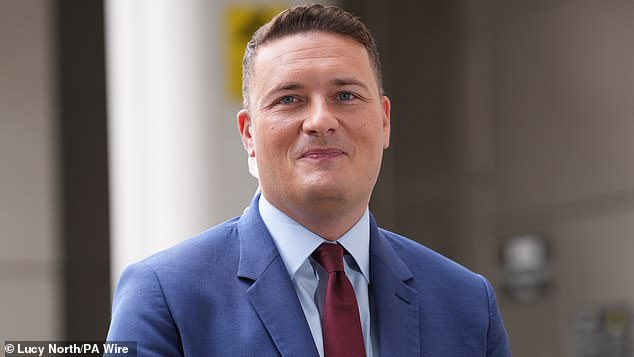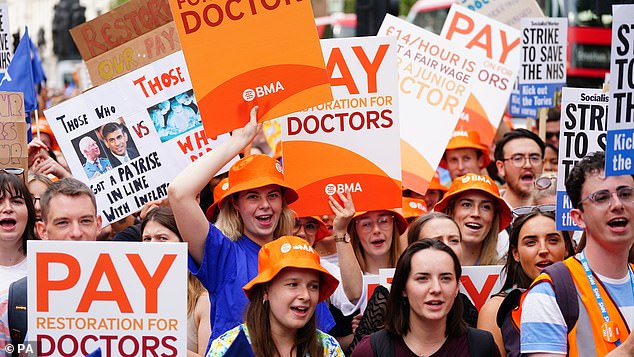Doctors could have some of their student loan debts written off as part of a package of measures to avert next week’s strike.
Talks between health secretary Wes Streeting and the British Medical Association ended without a breakthrough tonight but both sides described them as ‘constructive’.
Negotiations will continue between officials over the weekend.
Resident doctors, previously known as junior doctors, plan to walk out for five consecutive days from next Friday in a row over pay.
They have already received above inflation pay rises for the past three years, worth an extra 28.9 per cent in total.
This includes an inflation-busting rise this year of 5.4 per cent, which is the most generous in the public sector.
The medics have crippled the NHS by taking industrial action 11 times since 2022, forcing health bosses to cancel an estimated 1.5million appointments.
Ministers have said they will not budge on pay but are willing to discuss other issues facing resident doctors.

Health secretary Wes Streeting
The Department of Health and Social Care is examining how a new system of ‘forgiveness’ could be brought in for younger doctors who are paying back student debts of up to £100,000, the Guardian reported.
The government is looking at several ways such a scheme might work, including not charging interest on debts accrued by doctors in training while they were at medical school and cutting the overall debt by a certain sum for every year the doctor works in the NHS in England.
Supporters say it would incentivise doctors to stay in the NHS show them that ministers are keen to improve their finances – but without giving them annual pay rises that would prompt other public sector workers to seek the same.
Dr Melissa Ryan and Dr Ross Nieuwoudt, co-chairs of the BMA’s resident doctors committee, indicated that they would consider any proposal from the government on debt write-off.
However, any student debt write-off scheme for doctors would be complicated for the government and require the Treasury’s approval.
It could also prompt other health unions, such as the Royal College of Nursing, to demand the same arrangement for their members.
Speaking after the meeting, at the Houses of Parliament, Dr Nieuwoudt said: ‘We have a very small window of opportunity over the next few days to avert strike action.
‘Talks today have been constructive, they’re a first step, it was a very high-level discussion, we’re looking forward to more discussions to hopefully avert strike action – no-one wants strikes, patients don’t want strikes, we don’t want strikes and the Government doesn’t want strikes.

Doctors protest over pay
‘So hopefully the next few days will be very, very useful.’
Asked what the deadline is to avoid strike action, Dr Nieuwoudt said: ‘Not long, so time is not our friend at the moment, we have precious, precious few days in order to make sufficient progress in order to avert strike action – hopefully we can meet at a pace that is sufficient and reasonable.’
It is understood there will be further meetings between the BMA and government over the weekend at an ‘officials’ level, with potential for Mr Streeting and the union’s committee leaders to reconvene at the beginning of next week.
Mr Streeting said: ‘We had a constructive conversation with the BMA today and we’ll be having further conversations in the coming days to try to avert strike action.
‘While we cannot move on pay after a 28.9 per cent pay rise, we are working on areas where we can improve working lives for resident doctors.
‘Strikes have a serious cost for patients, so I am appealing to the BMA to call them off and instead work together to improve their members’ working conditions and continue rebuilding the NHS.’
In a statement issued after the talks, Dr Ryan and Dr Nieuwoudt said: ‘We are open to a number of solutions that address the cost of living of resident doctors.
‘We believe that pay remains the simplest and most effective way towards improving their working lives.
‘However, we are keen to explore additional measures the Government could agree to help restore the value and wellbeing of resident doctors.’










